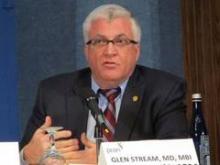WASHINGTON – The Patient-Centered Outcomes Research Institute is on track to release its initial research agenda by mid-April, officials from the organization said Feb. 27.
At its first public meeting, PCORI, created by the Affordable Care Act, sought the input of insurers, physicians, nurses, and patients on a draft agenda released in late January.
"We want to know whether in your opinion we’ve got the national priorities and the research agenda right," said Dr. Joe Selby, PCORI executive director.
The organization is charged with funding research that will help patients, physicians, and caregivers make better-informed decisions. The focus will be on coming up with evidence-based practices that allow individuals to more closely tailor decisions to their personal needs.
"I think maybe we have the chance to turn the world upside down just a bit," said Dr. Harlan Krumholz, a member of the PCORI Board of Governors. "Maybe we can invert the traditional power structure," he said, adding that the research that gets funded by PCORI will be projects that have patients at the absolute center.
The draft research agenda had very broad priorities – there were no condition-specific requests for proposal. "We didn’t want to say, ‘Well, you know, the people with atrial fibrillation, they’re more important than the people who got Parkinson’s,’ " said Dr. Krumholz, a cardiologist and director of the Yale-New Haven Hospital Center for Outcomes Research and Evaluation.
Many of the speakers said that PCORI had a difficult road ahead. Dr. Otis Brawley, chief medical officer of the American Cancer Society, said that much of medicine was based on emotion and habit, rather than evidence. "Rather than politicians talking about rationing, they need to be talking about how to make the system rational," he said, noting that there is overconsumption, underconsumption, and disparate levels of care in the United States.
But the biggest issue is the lack of faith in, and understanding of, science – not just among patients but among physicians too, Dr. Brawley said. "The problem for PCORI is getting people actually to believe the scientific findings you actually come up with," he said.
Dr. Ardis Dee Hoven, a member of the American Medical Association Board of Trustees, and Dr. Andrew Baskin, national medical director for quality and provider performance measurement at Aetna, agreed with Dr. Brawley that there needed to be some rationalization of treatment. Dr. Baskin spoke on behalf of America’s Health Insurance Plans. The insurers believe "that the initial focus of PCORI’s agenda should really be on looking at gaps in evidence, which tend to be in high-volume, high-cost, perhaps even high-risk situations," said Dr. Baskin.
Hitting those high-profile areas is especially important, because "if there’s not some early successes, people won’t believe in this process," he said.
"PCORI must address the prevention, management, and treatment of preventable diseases," which are "a major cost driver," said Dr. Hoven, noting that the AMA supported a priority focus on cardiovascular disease, diabetes care, and nutrition. In wellness, nutrition, and obesity there are a wide range of treatments, "but little clarity about what may work," said Dr. Hoven. Also, to be useful, evidence-based guidelines need to be made available to physicians in their offices, on a real-time basis, she said.
Dr. Glen Stream, president of the American Academy of Family Physicians, agreed with Dr. Hoven that information has to be at a physician’s fingertips at the point of care. The AAFP urged PCORI to "initially focus on conditions we see every day in our practices and for which evidence provides solid conclusions." Knowledge is not being well applied and is not well understood, said Dr. Stream. "We have a lot of low-hanging fruit we can take advantage of in that area."
He noted that although PCORI will not directly consider cost issues, the AAFP believes that through its efforts it "will bend the cost curve by identifying those cost-effective interventions and evidence-based interventions."
PCORI is accepting public comments on its research agenda and priorities through March 15. The group will publish a report summarizing the input, and then the Board of Governors will approve the changes at another public meeting in April.




